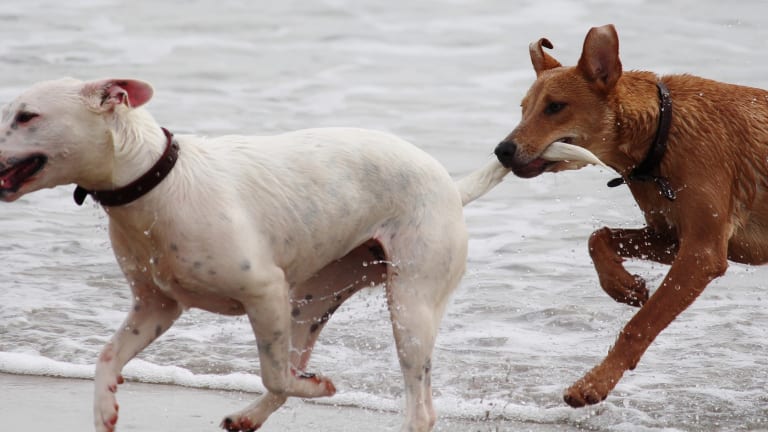
Some dogs with anal gland problems flea allergic dermatitis or other medical issues have been known to chase their rear ends. If your dog has been taught to spin on the spot or even to chase their own tail deliberately they may do so at other times to entertain themselves with or to try to get a reaction out of their handlers.

Its a way for them to have fun and expend some energy.
Why does my puppy always chase his tail. Obsessive chasing could be due to a brain abnormality akin to seizure-like activity. Other reasons could be a painful area where a tail was docked an infection or. Sometimes dogs chew their tails because theyre bored or curious about their tail.
Other times a dog chewing their tail can be a sign of something more serious. Here are a few of the most common. Oftentimes dogs will chase their tails because they are a bit bored.
Its a way for them to have fun and expend some energy. This is especially true for puppies who may not even realize that their tail is actually a part of their body but see it as a. Fleas and ticks are common reasons that your dog might chase their tail and biting their back end.
The pesty parasites can cause irritation to the base of your dogs tail causing them to seem like they are chasing their tail when really they are just trying to bite their back end. An obsessive dog suffering from separation anxiety may chase his tail to help calm himself while his owner is gone. Or your dog may chase his tail when he feels overcome with anxiety when a stranger approaches the house or during a loud thunderstorm.
In some cases tail-chasing may also be a form of idiopathic epilepsy says Dr. Jennifer Coates a veterinarian in Fort Collins Colorado. Another possible reason behind why dogs chase their tails may be because of fleas or ticks.
Sometimes their tail can become really itchy as a result of an infestation and they might chase their tail to try and bite it and relieve some of the itching. If you think the behaviour may be due to fleas and ticks check their skin. Some adult dogs might still chase their tails as a way to get your attention but tail-chasing in adult dogs tends to be a sign of a bigger problem.
If your dog seems obsessive about chasing her tail running in circles for long periods of time without being easily distracted from the behavior check with your vet about a possible obsessive-compulsive disorder. Another reason for tail chasing in puppies and dogs is attention-seeking. Your puppy is a very talented little creature and he may have quickly learned that chasing his tail results in your attention and the recognition of whoever else is in the room to be directed on him.
In addition to anxiety and stress there could be many reasons why a dog chases their tail. These include the following reasons. If your dog is bored and feels like they are not getting enough attention and theyre not in the mood to assume themselves with toys theyll chase their tail to pass the.
Some pups may be actually chasing and gnawing on their tails because of a local irritation. Allergies bug bites and small cuts are common culprits so if your pup is stuck in an itchy situation inspect his tail. Look for any cuts sores crusts pus unusual smells and local redness.
Finally some dogs will chase their own tails because they have been taught to do so and know that showing off will get them attention. If your dog has been taught to spin on the spot or even to chase their own tail deliberately they may do so at other times to entertain themselves with or to try to get a reaction out of their handlers. Experts recommend seeing a vet any time your dog suddenly starts to chase or bite his tail as dogs will chew at a painful area much like people rub an arthritic knee.
Sometimes theres no external reason for a dogs constant tail chewing. Instead its a way for the dog to let you know something is missing in his life whether its exercise or mental stimulation. Hes stressed and anxious and he takes that stress and anxiety out on himself.
Watching a dog chase her tail is undeniably entertaining but when she does it constantly it can get worrisome. Some dogs with anal gland problems flea allergic dermatitis or other medical issues have been known to chase their rear ends. Sometimes albeit uncommonly tail-chasing is a sign of obsessive compulsive disorder.
Does your dog seem to chase his or her tail more often when you leave the house. Separation anxiety is common for many pets. Some dogs develop compulsive behaviors as a way to cope with stress fear or anxiety she says.
If your dog is constantly chasing its tail consider a visit to the vet to discuss remedies for anxiety or stress The. If your dog is chasing his tail because of an anxiety disorder the best thing you can do is work closely with your vet to develop a treatment plan since its a.